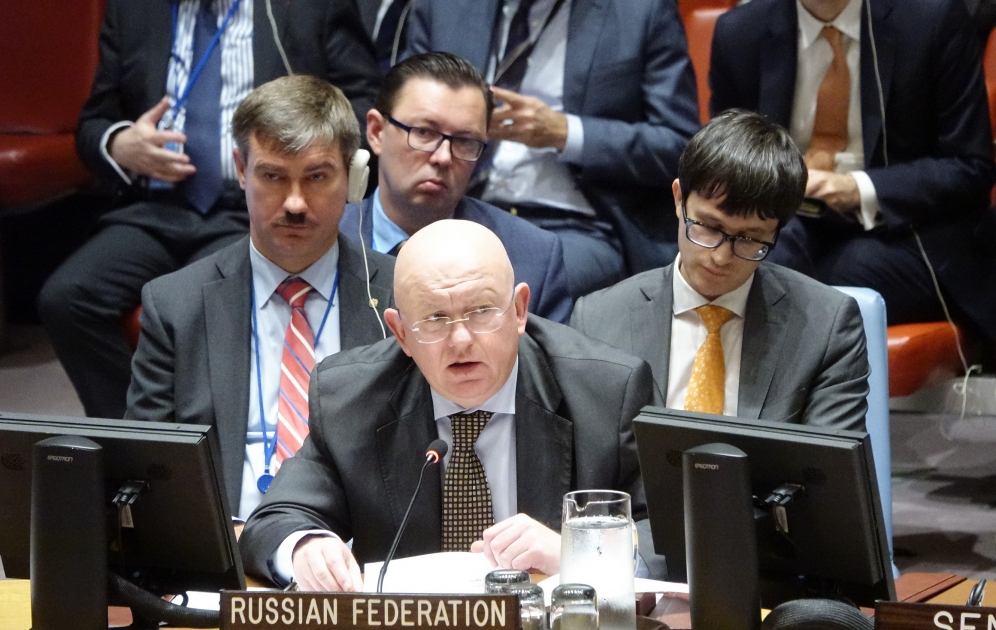Statement by Ambassador Vassily A. Nebenzia, Permanent Representative of the Russian Federation to the United Nations, during the UN Security Council meeting on the US resolution after the vote on Peace and security in Africa (Report of the Secretary-General on the Joint Force of the Group of Five for the Sahel (S/2017/869))
We are happy to see you, Mr. President, presiding over this meeting of the Security Council. We would like to thank Secretary-General Guterres; Minister for Foreign Affairs of Mali, Mr. Diop; Chairperson of the African Union Commission, Mr. Moussa Faki Mahamat; and European Union Special Representative for the Sahel, Mr. Losada Fernández, for their detailed briefings. We also welcome to the Chamber the Ministers for Foreign Affairs of Burkina Faso, Chad, Mauritania and the Niger.
We are concerned about the situation in the SaheloSaharan region. In spite of the efforts that have been made, terrorism — and as we were informed by our interlocutors during the Security Council’s recent visit to the region, I emphasize that I mean terrorism, not extremism — remains a very serious threat to security and stability in that part of the African continent.
On top of that, there are also transnational issues that have destabilizing effects, such as drug trafficking, the illegal arms trade, the smuggling of various goods, separatist tendencies, acute internal conflicts and complex humanitarian and socioeconomic circumstances.
The situation in the Sahel is a reminder of the destructive nature of frankly reckless outside interference by force in the internal affairs of sovereign States. It is worth recalling, as we have often done, that the regime-change operation in Libya, which was done in violation of international law and the relevant decisions of the Security Council, has been a catalyst for instability in the region. We welcome the establishment by the countries of the region of the Joint Force of the Group of Five for the Sahel (G-5 Sahel) to combat the terrorist threat, which was unanimously endorsed in resolution 2359 (2017).
We believe that the Joint Force is an appropriate response to regional issues along the lines of the principle of African solutions to African problems, which in our view is the only way to achieve sustainable peace in Africa. The Joint Force will help to address a whole range of tasks, not only counterterrorism efforts but also the work of eliminating the transborder criminal groups that are the terrorists’ allies.
We support the Joint Force’s operational deployment on the ground and its participants’ determination to achieve that as soon as possible, and urge them to strengthen their collaboration on that. However, going on the conclusions of the Security Council mission to the Sahelo-Saharan region, it appears that the countries of the G-5 Sahel are deploying their contingents at varying speeds and that some are falling behind.
In that regard, I would like to underscore that only a genuine joint and coordinated effort on the part of all members of the G-5 Sahel can have effective results. The members of the G-5 Sahel need and deserve support in responding to the challenges they face. We believe it is vital that the international community give them support.
We should carefully consider the options that the Secretary-General proposes in his report on resolution 2359 (2017) (S/2017/869) with regard to United Nations involvement in such efforts. However, we believe it will also be important to consider gradually expanding United Nations cooperation, based on the fourth option, especially since the mandates of the United Nations Multidimensional Integrated Stabilization Mission in Mali and the countries of the G-5 Sahel coincide where providing support to the Government of Mali and restoring its authority throughout the country are concerned. But there are a lot of problems that will have to be solved in that regard, so it would not be a good idea to get ahead of ourselves until the tasks mandated by the Security Council are fulfilled.
It is still quite clear that, in order to achieve longterm security, development and stability in the region, besides enhancing counter-terrorism measures, State institutions will have to be strengthened to ensure systemic economic and social development and universal respect for human rights and the rule of law. In that regard, we enthusiastically commend the programmes for developing remote regions that have been adopted by the Governments of Burkina Faso and Mauritania.
We believe that the foundation for making progress in the areas we have mentioned is the United Nations Integrated Strategy for the Sahel, which has not yet been exploited to its full potential. It will be essential to get more out of the Strategy’s existing mechanisms and to involve the countries of the Sahelo-Saharan region and of Africa as a whole in it as much as possible, with an emphasis on relevant steps to be taken by the African Union, the Economic Community of West African States and the G-5 Sahel itself. The views of regional partners should be a top priority in that process.
In conclusion, we would like to point out that in an age of globalization, terrorism, too, has become global. We can eradicate its threat only by uniting in the broadest possible front, which Russia has been calling for for a long time. Furthermore, my country has begun providing support to the security forces of a number of countries of the Sahel and will continue to do so. After all, the effectiveness of the Joint Force of the G-5 Sahel will ultimately depend on improving the potential of its national armed forces.
